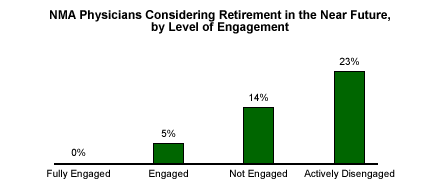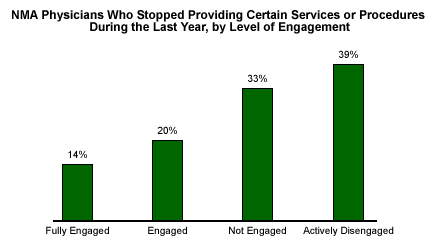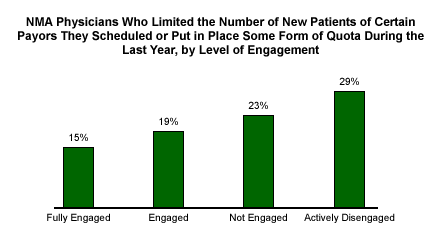This article is the third in a series on engagement levels among black physicians. The first article discussed the meaning of "engagement" and overall levels among black physicians, while the second article examined responses to specific questions (see Related Items).
A recent survey that Gallup conducted for the National Medical Association* suggests that black physicians are, at best, only somewhat engaged with the practice of medicine. Key questions follow from this finding: Does that lack of full engagement among black physicians affect the patients they treat? Is it exacerbating the disparity between minority and white populations' access to high-quality medical care?
Gallup asked physicians participating in the NMA survey about several possible changes in the way they had practiced medicine during the past year. The results suggest a remarkable link between physician attitudes and behaviors. Disengaged physicians may be more likely to:
- leave the practice of medicine, thus restricting access to care
- discontinue certain necessary services or procedures in their practices
- limit the number of certain types of patients coming into their practices
Leaving the Practice
Nearly a quarter of actively disengaged respondents were considering retirement in the near future. None of the fully engaged physicians surveyed were considering retirement at the time of the survey.

Many minority physicians practice in areas in which large numbers of minorities live. So, if black physicians are retiring in disproportionate numbers and closing down their practices, minority patients may be disproportionately losing access to needed healthcare services.
Discontinuing Services or Procedures
Many more disengaged physicians may continue to practice, but discontinue providing important services because of costs or other reasons. Almost 2 in 5 (39%) actively disengaged physicians who participated in the survey "stopped providing certain services or procedures" in the past year, while another 28% of actively disengaged respondents were considering doing so in the near future. In comparison, only 14% of fully engaged respondents had discontinued services in the past year, and 14% were contemplating doing so. It is clear that engagement with the profession has a meaningful impact on the perceived risks black physicians are willing to accept.

Restricting Access for Certain Types of Patients
Many black physicians are experiencing problems with reimbursement from payors -- namely, health insurance plans, Medicaid, and Medicare. It appears that these problems are driving physicians to limit the numbers of patients they will see. Over half of responding black physicians reported personally experiencing an annoyance or problem in the past six months with regard to reimbursement from: private managed care plans (65%), commercial health insurance plans (62%), state Medicaid or medical assistance (59%), and Medicare (54%).
To better understand the potential consequences of these payor problems, Gallup asked if physicians had limited the number of new patients of certain payors (for example, limited the number of Medicaid patients), or put in place some form of quota for patients from various payors during the past year. Again, there is a demonstrated link between disengagement and this sort of practice management. Almost 3 in 10 actively disengaged physicians (29%) said they had made this sort of change in their practice. Only half this proportion, 15%, of fully engaged physicians did so.

Bottom Line
Physician attitudes are important to the way that they practice medicine. Disengagement is driving black physicians toward early retirement and limitation of services, creating adverse consequences for doctors and patients alike. The end result? Low engagement among black physicians may present a significant barrier to reducing the disparity in health outcomes for minorities, even as those problems are made more pressing by the aging of the U.S. population.
Dr. Sharon Allison-Ottey, head of NMA's research committee and chief investigator of this survey, sees the situation among black physicians as an "acute crisis that needs to be addressed with some dramatic action."
"We sensed the disengagement every day, but we really didn't see how that disengagement played out in how we practice medicine. Now we see it clearly," Allison-Ottey says. "Re-engaging our physicians is our most important priority. But we cannot succeed in a system that is working against us and makes it impossible to do what we truly love -- help our patients be healthy."
*Results are based on mail interviews with 479 past and present NMA members, administered in July and August 2003.